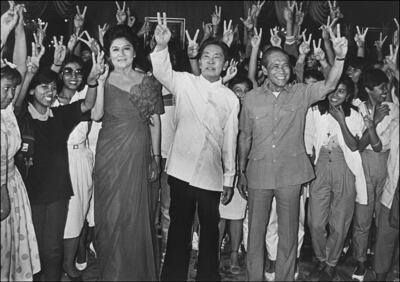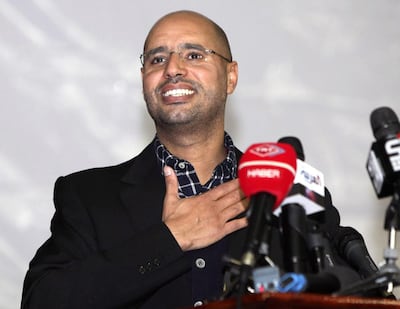Next year will mark the 50th anniversary of martial law being declared in the Philippines, a move that turned Ferdinand Marcos from an elected president into a one-man ruler with dictatorial powers; and a kleptocrat who is estimated to have amassed $10 billion in ill-gotten gains while committing grave human rights abuses over the following 14 years, until he was ousted in the People Power Revolution of 1986.
If there is some irony in the fact that 2022 is also the year when his son, Ferdinand Marcos Jr, may run for the presidency, there is also, with hindsight, an air of inevitability about it.
“Bongbong”, as Mr Marcos Jr is universally known, came very close to winning the vice presidency in 2016. His mother Imelda, once infamous for her opulent shoe collection, won four terms in the Philippines House of Representatives after returning from exile in 1991. His sister Imee is currently a senator, having previously been governor of the Marcos home province of Ilocos Norte and a representative for the same area. Despite his undoubted crimes, meanwhile, Marcos Sr was accorded the honour of a burial in the National Heroes’ Cemetery in 2016. With many now talking of the country enjoying a “golden age” under the rule of a man who was once reviled, the whitewashing of the Marcos era seems near complete.

But the Philippines is far from alone in displaying what many would consider bewildering nostalgia in a democracy for an authoritarian past. In neighbouring Indonesia, Defence Minister Prabowo Subianto appears little harmed by having been the son-in-law of the late dictator Suharto (who may have looted as much as $30bn from his country); indeed, Mr Prabowo is one of the frontrunners in surveys for Indonesia’s 2024 presidential election.
In August, I wrote about the re-emergence of Saif Al Islam Qaddafi, whose presidential ambitions in Libya appear to have solid support according to the limited polling available. There have been many reports about nostalgia for Saddam Hussein in Iraq, even though his brutality, his extensive use of the most appalling torture, and his killing of maybe hundreds of thousands of his own people is well known.
Other continents have not escaped this phenomenon. Hywel Williams, director of the Erasmus Historical and Cultural Research Forum in London, points out to me that “Europe has a big East-West divide” on this. There is fond looking back, for instance, at the regency of Miklos Horthy in Hungary, even though Horthy was an open anti-Semite who allied with Germany in the Second World War. It's the same in the case of the conservative, militarily dominated governments in Poland during the inter-war period. Even France is not immune, as became clear when 20 retired generals recently published a letter warning that the military might need to take action if “those who run our country” did not “end the growing chaos”, as they put it.

Mr Williams thinks that these instances of weakening attachments to the liberal democratic order are “directly related to the failure of capitalism to produce goods for the masses. That’s a very 1930s phenomenon, which now comes with a global outsourcing twist". It is certainly true that if the leaders of relatively new democracies fail to deliver the basic needs of the populace – adequate food, accommodation, education, health care and the realistic hope for a better life – then what may be a novel form of government may easily lose its lustre. In this case, its supposed advantages can appear hollow. Bobby Benedicto of McGill University in Canada wrote in an astute essay earlier this year: “Formal institutions of representation often fail to sate the sense of impotence that marks the lives of those who, in principle, come to possess freedom and autonomy.”
A yearning for the stability countries enjoyed under authoritarian regimes is also understandable if the democratic present is chaotic and dangerous. But there is also the issue of young people who never knew the past failing to be aware of its often very considerable downsides. “Because they have not experienced authoritarianism, they are likely to have both higher expectations of democracy and less information about the costs of authoritarianism,” wrote MIT researcher Marsin Alshamary in 2018. “By contrast, generations who lived their formative years under authoritarian rule are more forgiving towards democracies, despite their flaws.”
This is something of which Bongbong Marcos is very aware. Asked about his father’s rule in 2015, he was combative – and seductively selective – about the elder Marcos’s record: “Will I say sorry for the thousands and thousands of kilometers [of roads] that were built? Will I say sorry for the agricultural policy that brought us to self-sufficiency in rice? Will I say sorry for the power generation? Will I say sorry for the highest literacy rate in Asia? What am I to say sorry about?”
This has a clear appeal, not least because it is based on the truth, however partial. And when democratic politicians can be cast as elites who serve their own interests, not those of the people, a strong leader – who may also, perversely, be a child of privilege – can manage to present himself as the true voice of the masses. “Authoritarian power," Mr Benedicto wrote, "is only experienced as unfreedom if one does not see oneself in the figure that wields it. For those who do, it affords an opportunity to partake in the subjective freedom of a figure who appears as an agent of history rather than a slave to its forces.”
Agency: that word is key. If voters feel they are mere servants of an uncaring and capricious market, they may be open to the lure of a self-styled “fighter for the little folks” through whom real “people power” can be exercised on their behalf. If Bongbong Marcos and others can harness that, they may not just win power. They will also prove the truth of the old Soviet saying: “The future is certain; it’s the past which is unpredictable.”


